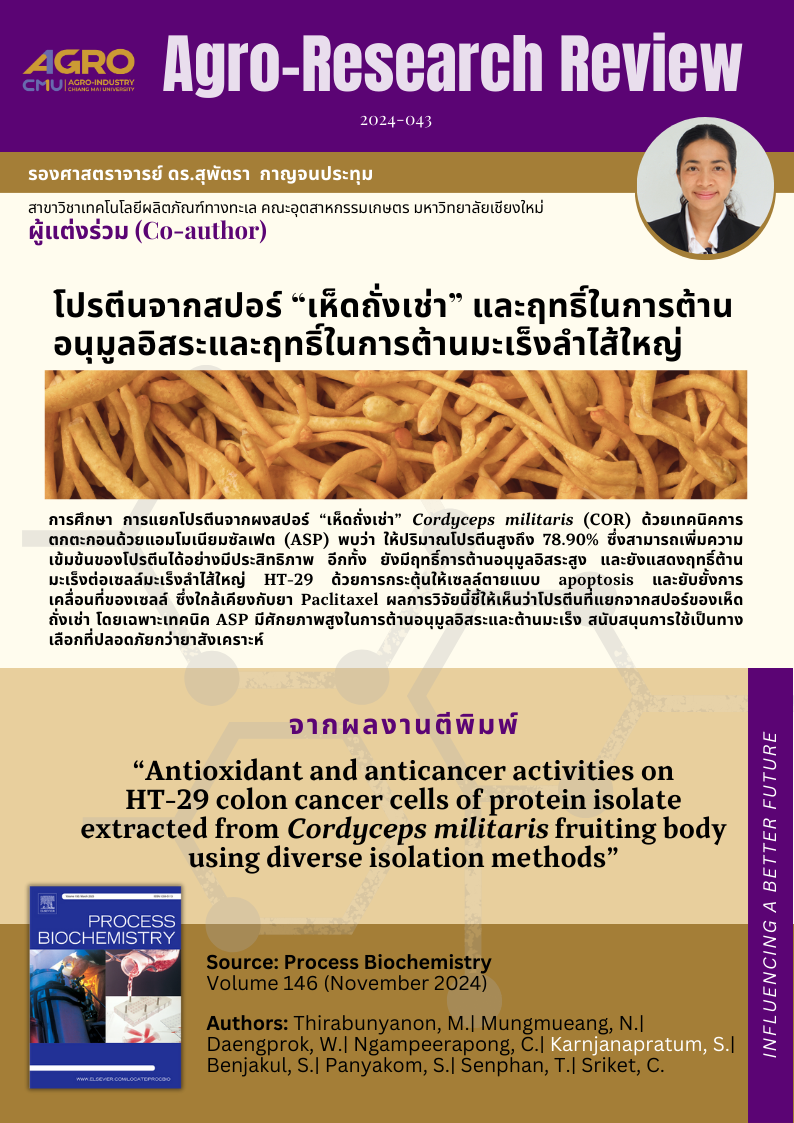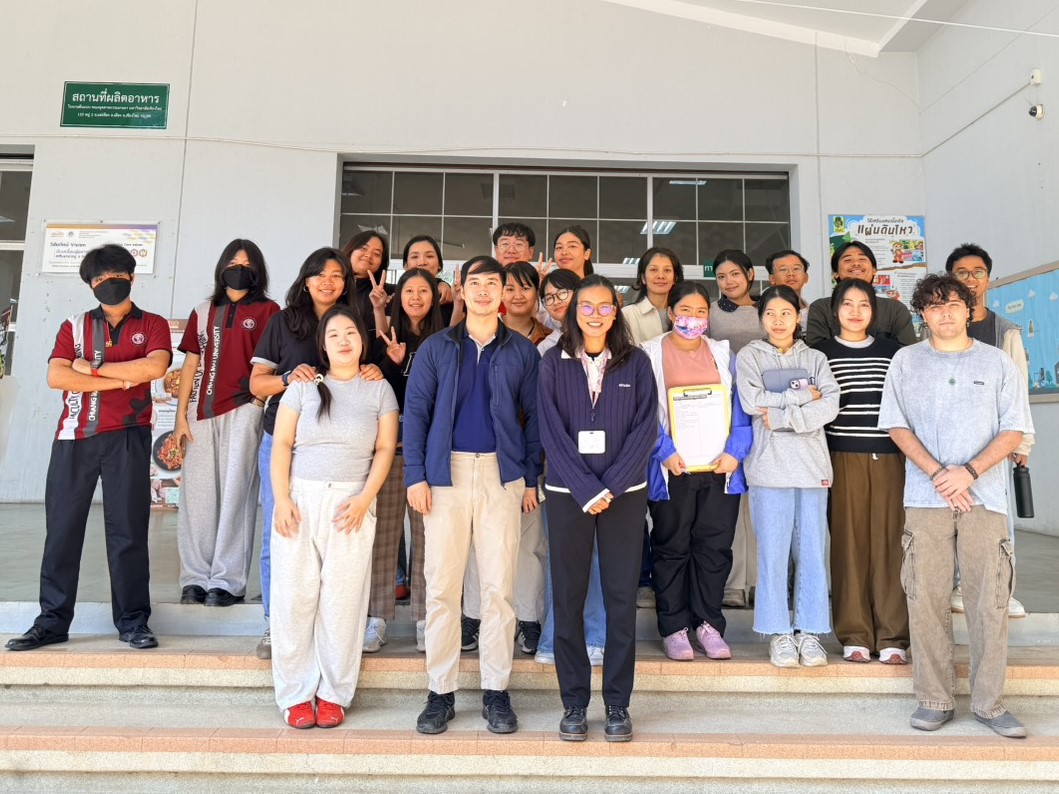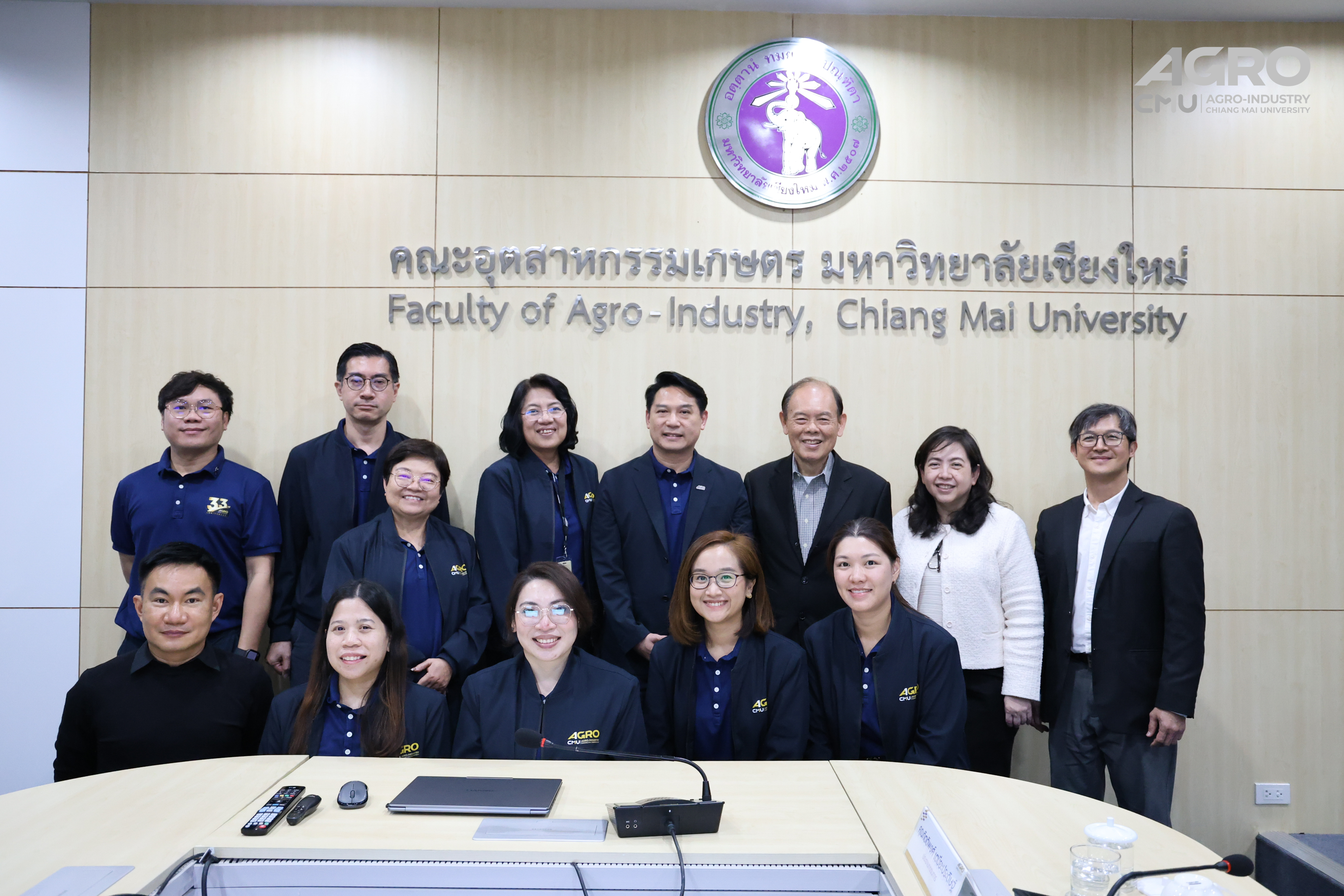
แนะนำงานวิจัย 2024-043: โปรตีนจากสปอร์เห็ดถั่งเช่า และฤทธิ์ในการต้านอนุมูลอิสระและฤทธิ์ในการต้านมะเร็งลำไส้ใหญ่
การศึกษาการแยกโปรตีนจากผงสปอร์เห็ดถั่งเช่า Cordyceps militaris (COR) ด้วยเทคนิคการตกตะกอนด้วยแอมโมเนียมซัลเฟต (ASP) พบว่า ให้ปริมาณโปรตีนสูงถึง 78.90% ซึ่งสามารถเพิ่มความเข้มข้นของโปรตีนได้อย่างมีประสิทธิภาพ อีกทั้ง ยังมีฤทธิ์การต้านอนุมูลอิสระสูง และยังแสดงฤทธิ์ต้านมะเร็งต่อเซลล์มะเร็งลำไส้ใหญ่ HT-29 ด้วยการกระตุ้นให้เซลล์ตายแบบ apoptosis และยับยั้งการเคลื่อนที่ของเซลล์ ซึ่งใกล้เคียงกับยา Paclitaxel ผลการวิจัยนี้ชี้ให้เห็นว่าโปรตีนที่แยกจากสปอร์ของเห็ดถั่งเช่า โดยเฉพาะเทคนิค ASP มีศักยภาพสูงในการต้านอนุมูลอิสระและต้านมะเร็ง สนับสนุนการใช้เป็นทางเลือกที่ปลอดภัยกว่ายาสังเคราะห์
A study on protein extraction from Cordyceps militaris (COR) powder using ammonium sulfate precipitation (ASP) revealed a high protein yield of 78.90%, demonstrating an efficient protein concentration method. The extracted protein exhibited strong antioxidant activity and showed anti-cancer effects against HT-29 colon cancer cells by inducing apoptosis and inhibiting cell migration, with effects comparable to Paclitaxel. These findings suggest that protein extracted from Cordyceps militaris, particularly through the ASP technique, has significant potential as a natural antioxidant and anti-cancer agent, supporting its use as a safer alternative to synthetic drugs.
Topic: Antioxidant and anticancer activities on HT-29 colon cancer cells of protein isolate extracted from Cordyceps militaris fruiting body using diverse isolation methods
Authors: Thirabunyanon, M.| Mungmueang, N.| Daengprok, W.| Ngampeerapong, C.| Karnjanapratum, S.| Benjakul, S.| Panyakom, S.| Senphan, T.| Sriket, C.
Abstract:
The present research examines different techniques for isolating proteins from Cordyceps militaris fruiting body powder (COR), namely ammonium sulfate precipitation (ASP), organic solvent precipitation (OSP), and isoelectric precipitation (IEP). ASP yielded the highest protein content (78.90 %), effectively concentrating proteins, while OSP and IEP also produced substantial yields (57.41 % and 69.06 %, respectively). Color analysis revealed differences among isolates, with ASP resulting in a darker hue. ASP and IEP showed higher red and yellow components, respectively. Essential amino acid content was significantly higher in ASP isolate compared to COR, indicating effective amino acid concentration. Thermal analysis revealed different decomposition temperatures and enthalpy values among isolates. OSP displayed the highest phenolic content, while IEP exhibited the highest flavonoid content. Antioxidant assays showed ASP to have the highest DPPH-RSA and ABTS-RSA, while IEP showed the highest FRAP value. ASP demonstrated anticancer activity against HT-29 colon cancer cells inducing cell death apoptosis and inhibiting cell migration, with an IC50 of 360.63 µg/mL, comparable to Paclitaxel. These findings suggest that Cordyceps militaris protein isolate, particularly from ASP, has significant antioxidant and anticancer potential, supporting its potential as a natural alternative to synthetic drugs with fewer side effects.
Keywords: Anticancer; Antioxidant; Cordyceps militaris; Isolation techniques; Protein isolate
View at publisher: https://www.sciencedirect.com/science/article/pii/S1359511324003210?via%3Dihub
#อกมช. #agrocmu #CMU




